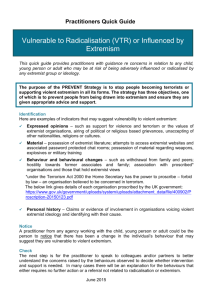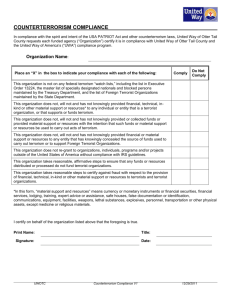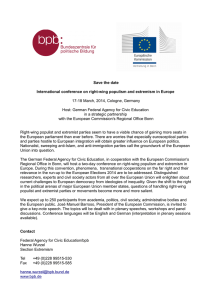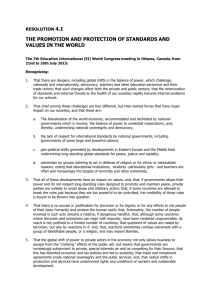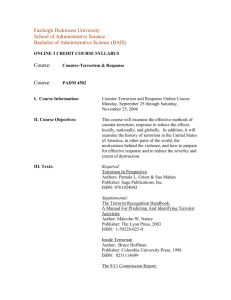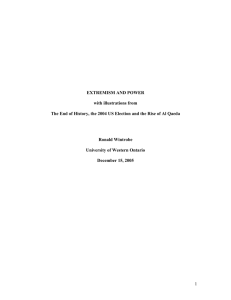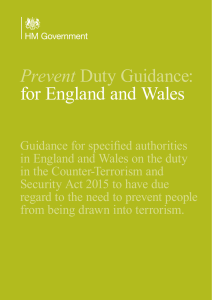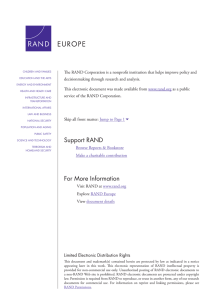PowerPoint - Hampshire Constabulary
advertisement
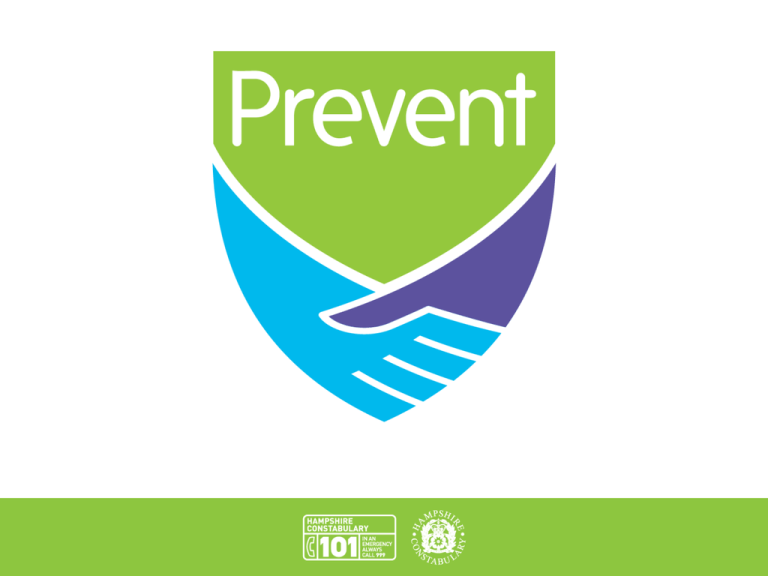
Prevent: Working together Hampshire Constabulary is committed to working with local communities to divert people away from any form of extremism What is Prevent? • Aims to reduce the risk to the UK from terrorism • Part of the Government Counter Terrorism Strategy • Targets all forms of extremism, including Extreme Far Right, Animal Rights Extremism, ISIS and Al Qaida influenced terrorism. Prevent THIS: What will be covered in the session • • • • Who, why and how? Meanings: grievance, terrorism, extremism and radicalisation Process and consequences (Pathways) What can you and society do about it? Pathways is a short film which portrays the process of radicalisation among young people Icebreaker 1 What does a terrorist look like? Consider stereotyping and prejudices What does a terrorist look like? Younes Tsouli Neil Lewington Mark Colborne Hasib Hussain David Copeland Aka: Terrorist 007 Cyber- Jihadist Right-wing white supremacist 7/7 suicide bomber (2005) London Nail Bomber Moroccan born Developed a bomb-making factory at his flat in Reading with the intent of carrying out acts of terrorism against Asian families Aryan right-wing extremist from Southampton Developed virtual terrorist networks to radicalise the young online and help them carry out terrorist attacks Aged 18, the Felt victimised for youngest of 4 his ginger hair. He suicide bombers plotted a cyanide who detonated attack; also to kill bombs in the Prince Charles and underground; his William so reddetonated on haired Harry could board a bus in be king Tavistock Square Right-wing white supremacist From Yateley in Hampshire, he made and detonated a bomb in Brixton and a nail bomb in Soho Icebreaker 2 Why does a person become a terrorist? Consider grievances, values, attitudes, beliefs What makes a person become a terrorist? • Need to belong or feel part of something • To correct what they believe is social, political, or historic injustice • Looking for an identity • Relate to or sympathise with a particular group/cause • Make a stand for their beliefs • Grievances: angry, isolated by peers, discriminated • Vulnerability: radicalised/groomed ~ Jihadi brides (list not exhaustive) Icebreaker 3 Why does it happen? Consider beliefs, emotions and experiences Why does it happen? • • • • For retribution or to avenge others/groups For media attention - propaganda Generate fear and unrest Belief that violence or its threat will be effective for change or the ‘greater good’ • No choice: no other non-violent way to achieve the desired change (list is not exhaustive) Common Words Simplified Terrorism Any act designed or intended to cause terror: usually based on a political objective Radicalisation The process by which a person comes to support terrorism and forms of extremism leading to terrorism Radicaliser: individual who encourages others to develop beliefs/views supportive of terrorism and forms of extremism leading to terrorism Radicalisation materials: cyber, writing, videos intended to influence Common Words Simplified Extremism Literally means driving (something) to the limit, or to the extreme. Today, the term is mostly used to refer to extreme political or religious matters Extremist A person who holds extreme political or religious views and supports illegal, violent, or other extreme action Grievance A circumstance regarded as just cause for complaint Resentment stemming from a feeling of having been wronged Common Words Simplified Ideology A set of beliefs or theories, usually political, held by an individual or a group Narrative Narrated account = a story such as those related to political views or religious beliefs Propaganda Information, ideas, or rumours deliberately spread widely to help or harm a person, group, movement, institution, nation, etc. Pathways DVD Main Characters Imran Shaada – Imran’s sister Tariq – Imran’s friend and radicaliser Matt Liam – Matt’s friend Sol – Liam’s friend and right-wing extremist Pathways Link Pathways Exercise Task In pairs or groups, discuss the question and points listed on your character task sheet Present your views to the audience, there is no right or wrong answer What can I do? Recognise Signs of Radicalisation and Extremism • • • • • • • • Use of inappropriate language Possession of violent extremist literature Use of internet to explore extremist material Behavioural changes Expressing extremist views Advocating/supporting violent actions and methods Association with known extremists/groups Seeking to recruit others to an extremist ideology (list is not exhaustive) What should I do? If you think someone may be trying to groom or radicalise you or someone you know … Get advice.. Its ok to ask….Speak to adult for advice if you’re not sure Talking can help keep you and/or your friends safe from extremist behaviour and help prevent future acts of terrorism Teacher Parent or Carer Police Officer Youth Worker Family Member Social Worker The fight against terrorism is everyone’s responsibility Who to contact Hampshire Constabulary For advice or support call 101 or e-mail the prevent team: prevent.engagement@hampshire.pnn.police.uk Call 999 if you or others are in immediate danger Follow us on Twitter: @PreventHants The Anti-Terrorist Hotline: 0800 789 321 To report any concerns or information you have of terrorist activity The Government webpage: www.gov.uk/report-terrorism To report anonymously any terrorist information, pictures or videos you find on the internet


